Not even those of us who are scientifically trained actually do objective science consistently well. Like all other humans, we are predisposed, with biased, emotionally prejudiced human minds, to first see what we want or expect to see – a dilemma first illustrated by Plato as the “Allegory of the Cave.” In one of the few things that Plato got right, he showed how each of us allows our subjective will to overlay and mask anything inconvenient about the objective world.*
 Now Chris Mooney (author of the Republican War on Science) explains how this age-old human flaw is being analyzed in scientific detail, by researchers who reveal it to be dismayingly intractable. It seems that obstinacy is as deeply rooted as love or sex! See: The Science of Why We don’t Believe Science. (See my review of Chris Mooney’s book on my website.)
Now Chris Mooney (author of the Republican War on Science) explains how this age-old human flaw is being analyzed in scientific detail, by researchers who reveal it to be dismayingly intractable. It seems that obstinacy is as deeply rooted as love or sex! See: The Science of Why We don’t Believe Science. (See my review of Chris Mooney’s book on my website.)
Of course, there’s hope, or we would never have climbed so far. In the last few centuries w discovered a general way around this dilemma. It is through the enlightenment process that underlies almost everything successful about our civilization – not only science but also free markets, justice and democracy. The one tool that has ever allowed humans to penetrate the veil of their own talented delusions.
 It is called Reciprocal Accountability. Or criticism, the only known antidote to error.
It is called Reciprocal Accountability. Or criticism, the only known antidote to error.
We may not be able to spot our own mistakes and delusions, but others will gladly point them out for us! Moreover, this favor is one that your FOES will happily do for you! (How nice of them.) And, in return, you will eagerly return the favor. In our enlightenment – and especially in science – this process is tuned to maximize truth-output and minimize blood-on-the-floor. But it requires some maturity. Some willingness to let the process play out. Willingness to negotiate. Calmness and even humor.
It doesn’t work amid rage or “culture war.” Which is precisely why culture war is being pushed on us. By those who want the enlightenment to fail.
Which brings us back to Mooney’s cogent and detailed article, which explains the problem of “narrowcasting” to specifically biased audience groups, who get to wallow in endless reinforcement of their pre-existing views, avoiding the discomfort of cognitive dissonance from things like evidence…
… a problem – exacerbated by the internet age – that I predicted in my 1989 novel EARTH – describing a near future in which people shift their attention only to those sources that confirm and reinforce their pre-existing beliefs. (A forecast I would rather not have seen come true.)
———
* How ironic then, that the Platonists ( including his successors at “logic-incantation,” like Hegel, Marx and Rand) have excelled even the priests at weaving subjective spells to mask the real world. Oh we are good at this. Delusion truly is the greatest human talent! Indeed, all you sci fi fans… what talent of YOURS am I paid to cater-to? Hm? 😉



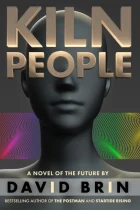

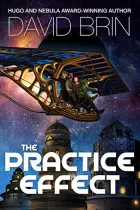





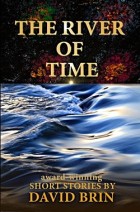
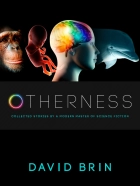
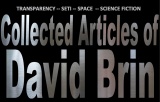
Well damn it, I am not obstinant or contrary. I agree with myself virtally all the time. Truth is useful but do you really want to be stuck in it with a bunch of people who are, shall we say, not really “our sort” of people? In a good old culture war you can stay with your pals without all the itchy bits of evidence getting in the way.
The process that you’re describing requires work. I struggle with my students to get them to understand and use critical thinking, but they just want to be given a finite set of small answers. Thus has it ever been, but today, we believe in democracy.
I always feel amazed at the speed with which most people will latch on to a single fact, skip the generation and rational testing of any hypothesis, and declare a “logical” proof of their own pet theory. Time and again I reply, “Can you walk me through your rational process so I can validate your results?” The response is usually derision that I can’t immediately grasp the brilliance of their somewhat spurious conclusions. I’m just not smart enough to grasp the intuitive nature of their leaps of logic.
From my point of view I keep comming back to the conclusion that it’s sloppy self promoting “logic” of the most subjective kind which finds facts to support desired conclusions instead of carefully searching for all facts to discover the truth.
I hope this helps.
I came up with a saying for that sort of “narrowcasting” you mention. It’s more of a sarcastic aphorism, really: “Rationalization is the shortest path to personal truth.”
I suppose you could say we are generally an obstinate bunch. I believe lately it’s been taken to great heights, though, judging from history, not new ones. As with many other human traits that are deeply ingrained, this sort of attitude has roots in survival mechanisms (or so I believe) which, in most cases allow a creature to prevail in otherwise hopeless situations. As with getting sweaty palms, rapid heartbeat and that jittery feeling in your stomache in front of an audience, it doesn’t always serve us in our more modern, more civilized world and, instead, acts as a hindrance instead of an advantage. For me, when I find my self getting stubborn, or cannot find my self at all agreeing with someone, I consider that a signal to look deeper into my own points of view to see if my filters are working a “little too good” to properly hear the other side. Hope others out there can do it, too.
This becomes a real problem when even the skeptical sometimes fail to perceive their own biases. One must be convincing in order to convince.
I recently encountered a situation in which a celebrity skeptic was arguing on the mainstream-view side about a particular subject, with someone else who was skeptical of the idea. I mentioned to the celebrity that his reliance on the “consensus” argument to support his point of view was logically flawed. I did not claim he was wrong; only that his argument — his attempt to convince others, which is more debate than science — did not flow from the actual evidence.
The celebrity was convinced that his argument must be right because “everybody” thought so, including a large body of scientists. (Which is true, but other scientists disagree.) I could do little but sigh at the lack of insight on the part of this famous “skeptic”, who was arguing about this subject in exactly the same way his opponent “believers” often argued about other subjects. He did not see that even though he was right in so many things, the actual evidence did not support the “rightness” of his argument about this particular thing, and he was being just as biased and behaving just as badly as those with whom he often argued.
Often, it is not enough just to be correct. Scientists are a minority; in order to be successful in their endeavors they have to convince others of their correctness. As evidence of how this sometimes fails I offer the example of climate science, in which principal researchers acted in ways that very seriously damaged their own credibility. As the situation is now, even if they were 100% correct in their conclusions (probably not, just due to the nature of current climate science), there are many they will fail to convince, because of their past actions.
The ticklish thing, of course, is that the argument applies to faith in enlightenment itself. We must remember that this irksome human tendency has no agenda; it will thrive on literally anything. Undaunted, it insinuates itself again as soon as we pat ourselves on the back for the rationality we so rightly cherish and foster. My personal antidote is to remember–even as I strive to be objective–that there is after all really no such thing as objective reality. It’s an ideal.
A compass needle (to belabor the point) is generally used for reference, not for sailing straight-away to the pole. The utility of reason isn’t that it dispells mystery, or replaces emotional convictions with facts, but rather that it filters these things out and moves them to one side of the equation. Truth isn’t revealed, but generated…it’s an epistomological proccess, not a physical one. Though the caveat may seem minor, I believe the difference is profound, and ultimately vital.
This is nicely written, as usual. I would love for the terminology of the culture war to acknowledge that science IS an ongoing debate. Drives me nuts when I hear people wanting to ‘debate’ science. Science IS the debate, and it even limits those conclusions which are not decisive to the term ‘theory.’
How great would it be for any and all tv shows featuring a debate between talking heads to enforce this as policy. A flowchart for rational debate:
How to have a rational discussion
This flow chart is a good first attempt and I agree with it in spirit, but I’m going to pick at it because,
A.) I like poking at the undersides of ideas and seeing what they’ll do, and
B.) As I indicated earlier, I’m uncomfortable with the superior tone we often have, when championing rationality (it could so easily turn on us, making rationality into mere “rationalization”).
First I’ll take on the three questions that potentially lead to termination:
1. Can you envision anything that will change your mind about this topic?
Answer: I can’t imagine anything changing my mind about 2 plus 2 equalling 4. May I not still try to convince you that they do? And what if there’s a way to convince me they don’t, which I myself haven’t imagined? Would you skip the discussion anyway, and leave me in darkness? The whole point of arguing is that we DON’T imagine ourselves to be wrong. We must be CONVINCED.
2. If one of your arguments is shown to be faulty, will you stop using that argument?
Answer: Possibly, but if I insist that your judgement is premature, will you hear me out as I expound more fully? Am I to be allowed room to think on my feet, changing my tactics as (under your valued prodding) I myself more fully understand what it is I’m saying, and how to illustrate it?
3. Are you willing to abide by the basic principles of reason in discussing this topic?
Answer: Can you provide a quantification of these principles that is itself unassailable by rational argument? Really? Do we have time to do that, before we begin?
Next, the four rules we’re expected to abide by.
1. Do not introduce new arguments while another argument has yet to be resolved.
–That’s awfully linear. Is there no room for finesse? What if multiple arguments must be relied upon? Arguments that seem unrelated until they converge upon my point?
2. Do not move on to another argument if it is shown that a fact you have relied upon is inaccurate.
–Why not?
3. Provide evidence for your position or arguments.
–That’s fine if we’re arguing over the Loch Ness Monster. But what if we’re arguing over opinions, interpretations or procedures? In that case my evidence IS my arguement.
4. Do not argue that you do not “need” evidence.
–I won’t, unless I don’t.
Congradulations. This is how rational human beings exchange ideas.
–But not how they create them. Good argument is art, not algorithm.
I hope you don’t mind if I pick back a bit.
First, I think this flowchart is supposed to be from the viewpoint of a hypothetical rational person, about to have a “discussion” with someone who might not be. So your point #1 would probably never arise; it is intended to apply to the other party’s (possibly less than rational) position.
Point 2: If your argument is “shown to be faulty”, but you refine the idea so that it is no longer faulty, then you HAVE stopped using it… you are now using a different argument.
Point 3: The basic principles of reason, as they apply to discussion, are already largely defined and codified in a rational manner. Basic rules of debate (other than time limits and the like) apply. Logical fallacies can be pointed out as logical fallacies. There is not really a lot of wiggle room here.
As for the “rules”:
1. To make orderly discussion possible, it is generally necessary to limit the discussion to one topic at a time. That is why Robert’s Rules of Order allow someone to “call the question”: to yank the discussion back to the topic at hand. This might not always be convenient but it has its purpose. Proofs are linear for a reason.
2. See (1) just above. Proofs are linear for a reason. If any part of a proof fails, then subsequent parts also necessarily fail. You cannot build sound argument on top of faulty assumptions or deductions.
3. If we’re arguing over opinions, then by definition we are NOT having a rational argument, and your objection doesn’t apply.
4. I don’t need to answer this one.
“This is how rational human beings exchange ideas. … –But not how they create them. Good argument is art, not algorithm.”
A good — even convincing — argument may be art, not algorithm. But a good RATIONAL argument is algorithm, not art. If you are arguing about some scientific conclusion, the former should not — and rightfully would not — get you anywhere. On the other hand, people who have little understanding of science often do not understand why the latter is necessary or even desirable.
To be clear: I am not accusing you of that last bit, just making a general observation.
Touche, in every case. I’m glad I wrote what I did so that I that I could have the pleasure of reading your rebuttal. I might babble something about about the retroactive nature of deductive reasoning, or false assumtions verses arbitrary ones, but it would probably lead into a swamp. Thanks for responding so clearly to my mischievous comments.
Love the flowchart! I know many people who could benefit from it, including myself. It’s a good reminder.
Here’s an interesting online tool for critical thinking http://www.trustortrash.org/
It was developed to help sort reliable and unreliable genetics health information, but its usefulness really goes far beyond just that.
I think it is important to rmeber Koch’s postulates as they are understood by the average seminar student in many science programs. This revision is as follows (slightly differing from the original):
1. How can “Koch” be pronounced this way?
2. What does postulate mean?
3. Did Prof say we could go get a Coke? I know we can’t do coke, right?
4.Is there such a thing as a Low Pothesisis?
Pingback: David Brin’s CITOKATE sounds very much like Elinor #Ostrom and her insistence on “contestation” | TT's Lost in Tokyo -- by TokyoTom